-
 Bitcoin
Bitcoin $88,165.3830
4.45% -
 Ethereum
Ethereum $1,625.6684
3.15% -
 Tether USDt
Tether USDt $1.0003
0.03% -
 XRP
XRP $2.1145
3.08% -
 BNB
BNB $604.2805
2.78% -
 Solana
Solana $138.5597
1.63% -
 USDC
USDC $1.0000
0.01% -
 Dogecoin
Dogecoin $0.1611
5.18% -
 TRON
TRON $0.2438
-0.44% -
 Cardano
Cardano $0.6351
3.76% -
 Chainlink
Chainlink $13.3718
1.88% -
 Avalanche
Avalanche $20.6518
6.55% -
 UNUS SED LEO
UNUS SED LEO $9.1179
-2.25% -
 Stellar
Stellar $0.2584
6.98% -
 Toncoin
Toncoin $2.9759
-0.58% -
 Shiba Inu
Shiba Inu $0.0...01257
1.46% -
 Sui
Sui $2.2444
7.11% -
 Hedera
Hedera $0.1708
4.15% -
 Bitcoin Cash
Bitcoin Cash $345.2115
3.88% -
 Polkadot
Polkadot $3.8920
0.39% -
 Litecoin
Litecoin $79.7901
4.89% -
 Hyperliquid
Hyperliquid $18.0228
3.58% -
 Dai
Dai $0.9999
0.00% -
 Bitget Token
Bitget Token $4.4675
1.86% -
 Ethena USDe
Ethena USDe $0.9993
0.00% -
 Pi
Pi $0.6375
1.55% -
 Monero
Monero $214.7310
-1.32% -
 Uniswap
Uniswap $5.4128
3.57% -
 Pepe
Pepe $0.0...07912
5.87% -
 Aptos
Aptos $5.0623
1.32%
Why do some countries ban Bitcoin payment platforms? What are the compliance challenges?
Bitcoin payment platforms face bans due to financial stability, regulatory oversight, and consumer protection concerns, complicating compliance with AML, KYC, and tax laws.
Apr 19, 2025 at 06:01 pm

Introduction to Bitcoin and Payment Platforms
Bitcoin, the pioneering cryptocurrency, has revolutionized the financial world since its inception in 2009. It operates on a decentralized network, allowing users to make transactions without the need for intermediaries such as banks. Bitcoin payment platforms have emerged as a convenient way for businesses and individuals to accept and process Bitcoin payments. However, the rise of these platforms has not been without controversy, as several countries have imposed bans on their use. This article delves into the reasons behind these bans and the compliance challenges that Bitcoin payment platforms face.
Reasons for Banning Bitcoin Payment Platforms
Countries that have banned Bitcoin payment platforms often cite several key concerns. Financial stability is a primary reason; the volatility of Bitcoin can pose significant risks to the economy. For instance, a sudden drop in Bitcoin's value could lead to widespread financial losses for businesses and consumers who have invested heavily in the cryptocurrency. Regulatory oversight is another crucial factor. Governments are wary of the lack of control over transactions that occur on decentralized networks, which can facilitate illegal activities such as money laundering and tax evasion.
Consumer protection is also a significant concern. The anonymity and lack of recourse in Bitcoin transactions can leave consumers vulnerable to fraud and scams. Some countries have banned Bitcoin payment platforms to protect their citizens from these risks. Additionally, capital control plays a role in some nations' decisions to ban these platforms. Countries with strict capital controls may see Bitcoin as a threat to their ability to manage the flow of money in and out of their economies.
Compliance Challenges Faced by Bitcoin Payment Platforms
Bitcoin payment platforms face numerous compliance challenges, primarily due to the decentralized and often unregulated nature of cryptocurrencies. Anti-Money Laundering (AML) and Know Your Customer (KYC) regulations are among the most significant hurdles. These regulations require businesses to verify the identities of their customers and report any suspicious activities. However, the anonymous nature of Bitcoin transactions makes it difficult for payment platforms to comply with these requirements.
Tax compliance is another major challenge. Governments around the world are still grappling with how to tax cryptocurrency transactions. Bitcoin payment platforms must navigate complex and often unclear tax laws, which can vary significantly from one jurisdiction to another. This uncertainty can lead to compliance issues and potential legal repercussions.
Data privacy and security are also critical concerns. Bitcoin payment platforms must ensure the security of their users' data and transactions, which can be challenging given the sophisticated cyber threats targeting the cryptocurrency industry. Compliance with data protection regulations, such as the General Data Protection Regulation (GDPR) in the European Union, adds another layer of complexity.
Case Studies of Countries Banning Bitcoin Payment Platforms
Several countries have taken action against Bitcoin payment platforms, each with its own set of reasons and compliance challenges. China, for example, has imposed strict regulations on cryptocurrency transactions, including a ban on Bitcoin payment platforms. The Chinese government's primary concerns include financial stability, capital control, and the prevention of illegal activities. The compliance challenges in China are exacerbated by the country's strict regulatory environment and the need for platforms to navigate complex bureaucratic processes.
India has also banned Bitcoin payment platforms, citing concerns over financial stability and consumer protection. The Indian government has struggled with the compliance challenges posed by cryptocurrencies, including the enforcement of AML and KYC regulations. The lack of clear guidelines on how to tax cryptocurrency transactions has further complicated the situation for Bitcoin payment platforms operating in India.
Russia has taken a more nuanced approach, banning Bitcoin payment platforms while allowing certain types of cryptocurrency transactions. The Russian government's main concerns revolve around financial stability and the prevention of money laundering. Compliance challenges in Russia include navigating the country's stringent financial regulations and ensuring adherence to international AML and KYC standards.
Strategies for Bitcoin Payment Platforms to Navigate Compliance Challenges
Despite the challenges, Bitcoin payment platforms can take several steps to navigate the regulatory landscape and ensure compliance. Implementing robust AML and KYC procedures is essential. Platforms should use advanced identity verification technologies and maintain detailed records of all transactions to comply with these regulations. Regular audits and compliance checks can help identify and address any potential issues.
Engaging with regulators is another crucial strategy. By actively participating in regulatory discussions and working with government agencies, Bitcoin payment platforms can help shape the regulatory environment and ensure that their concerns are heard. This engagement can also provide valuable insights into upcoming regulatory changes and help platforms prepare accordingly.
Investing in security measures is vital to protect users' data and transactions. Bitcoin payment platforms should use encryption technologies, multi-factor authentication, and other security protocols to safeguard against cyber threats. Compliance with data protection regulations, such as GDPR, can be achieved by implementing comprehensive data privacy policies and ensuring that users' rights are respected.
Staying informed about tax laws is also important. Bitcoin payment platforms should work with tax professionals to understand their obligations and ensure compliance with tax regulations. This may involve setting up systems to track and report cryptocurrency transactions accurately and promptly.
Impact of Bans on Bitcoin Payment Platforms and the Cryptocurrency Ecosystem
The bans imposed by some countries on Bitcoin payment platforms have significant implications for both the platforms themselves and the broader cryptocurrency ecosystem. For Bitcoin payment platforms, these bans can severely limit their ability to operate and grow. Platforms may need to exit certain markets or pivot their business models to comply with local regulations. This can lead to reduced revenue and profitability, as well as increased operational costs associated with compliance efforts.
For the cryptocurrency ecosystem, these bans can stifle innovation and hinder the adoption of cryptocurrencies. The lack of accessible and user-friendly payment platforms can deter businesses and consumers from using Bitcoin and other cryptocurrencies. This, in turn, can slow the development of the cryptocurrency market and reduce its overall impact on the global financial system.
For consumers, the bans can limit their options for using Bitcoin as a payment method. This can be particularly challenging for those who rely on cryptocurrencies for financial inclusion, as they may find it harder to access the benefits of digital currencies. The bans can also lead to increased reliance on less regulated or underground payment methods, which can pose additional risks.
Frequently Asked Questions
Q: Can Bitcoin payment platforms operate in countries where they are banned?
A: In countries where Bitcoin payment platforms are banned, operating such platforms is illegal and can result in severe penalties. However, some platforms may continue to operate underground or use VPNs and other methods to circumvent the bans. This approach carries significant risks, including legal repercussions and increased vulnerability to cyber threats.
Q: How do bans on Bitcoin payment platforms affect the price of Bitcoin?
A: Bans on Bitcoin payment platforms can have a mixed impact on the price of Bitcoin. On one hand, the reduced accessibility and adoption of Bitcoin in banned countries can lead to decreased demand and lower prices. On the other hand, the increased scarcity of legal platforms can drive up demand among users who are willing to take the risk, potentially leading to higher prices.
Q: Are there any alternatives to Bitcoin payment platforms for businesses that want to accept cryptocurrencies?
A: Yes, there are several alternatives to Bitcoin payment platforms. Businesses can use cryptocurrency exchanges, which allow them to convert cryptocurrencies into traditional currencies. Another option is to use decentralized finance (DeFi) platforms, which offer a range of financial services without the need for intermediaries. Additionally, some businesses may choose to accept cryptocurrencies directly and manage the transactions themselves.
Q: How can individuals protect themselves if they use Bitcoin payment platforms in countries where they are not banned?
A: Individuals can take several steps to protect themselves when using Bitcoin payment platforms. They should use strong passwords and enable multi-factor authentication to secure their accounts. It's also important to research the platform's reputation and read user reviews to ensure it is trustworthy. Additionally, individuals should be cautious of phishing scams and never share their private keys or seed phrases with anyone.
Disclaimer:info@kdj.com
The information provided is not trading advice. kdj.com does not assume any responsibility for any investments made based on the information provided in this article. Cryptocurrencies are highly volatile and it is highly recommended that you invest with caution after thorough research!
If you believe that the content used on this website infringes your copyright, please contact us immediately (info@kdj.com) and we will delete it promptly.
- As the Crypto Market Evolves, XRP and Dogecoin Are Back in the Spotlight
- 2025-04-22 00:00:44
- Onchain social media platform Zora said its ZORA token will go live
- 2025-04-22 00:00:44
- Bitcoin Eyes $88,000 Breakout as Safe-Haven Narrative Gains Steam
- 2025-04-21 23:55:12
- As the Cryptocurrency Market Begins to Recover and Bitcoin Moves Closer to the $90,000 Mark, Investor Interest Is Gradually Returning
- 2025-04-21 23:55:12
- Blurring the Lines Between Decentralized Finance and Traditional Finance, Ripple's XRP Ledger (XRPL) Is at the Center of a New Attempt to Integrate Blockchain into the Heart of Institutional Trading
- 2025-04-21 23:50:13
- MicroStrategy Adds Another $555M Bitcoin Buy to Its Portfolio as BTC Trades Near $85K
- 2025-04-21 23:50:13
Related knowledge
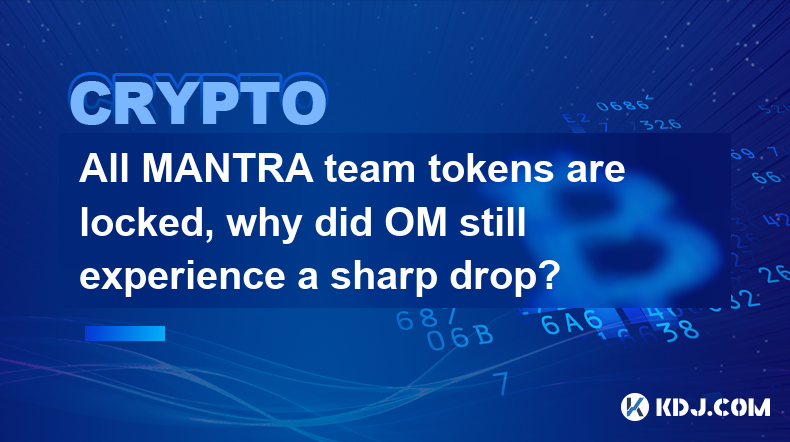
All MANTRA team tokens are locked, why did OM still experience a sharp drop?
Apr 20,2025 at 11:14am
Introduction to MANTRA and OM TokenThe MANTRA project is a blockchain platform that aims to provide a scalable and secure environment for decentralized applications (dApps). The native token of the MANTRA ecosystem is OM, which plays a crucial role in governance, staking, and other functionalities within the platform. Recently, the MANTRA team announced...
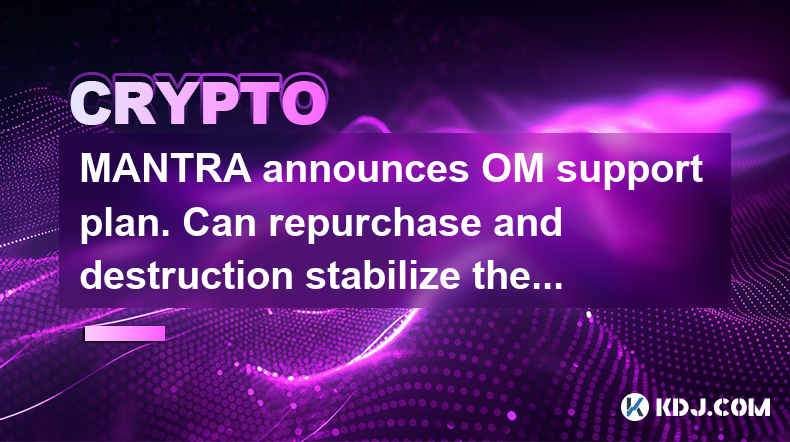
MANTRA announces OM support plan. Can repurchase and destruction stabilize the currency price?
Apr 21,2025 at 01:57pm
MANTRA, a notable player in the cryptocurrency ecosystem, has recently announced an OM support plan that includes mechanisms for repurchasing and destroying tokens. This move has sparked significant interest and discussion within the crypto community, particularly around its potential impact on the stability of the OM token's price. In this article, we ...

A large amount of OM was liquidated due to collateralization, causing a sharp drop? MANTRA analyzes the reasons for the market turmoil
Apr 21,2025 at 01:57am
The cryptocurrency market is known for its volatility, and sharp price movements can often be attributed to a variety of factors. Recently, a large amount of OM (Mantra DAO's native token) was liquidated due to collateralization issues, leading to significant market turmoil. In this article, MANTRA analyzes the reasons behind this event and the subseque...
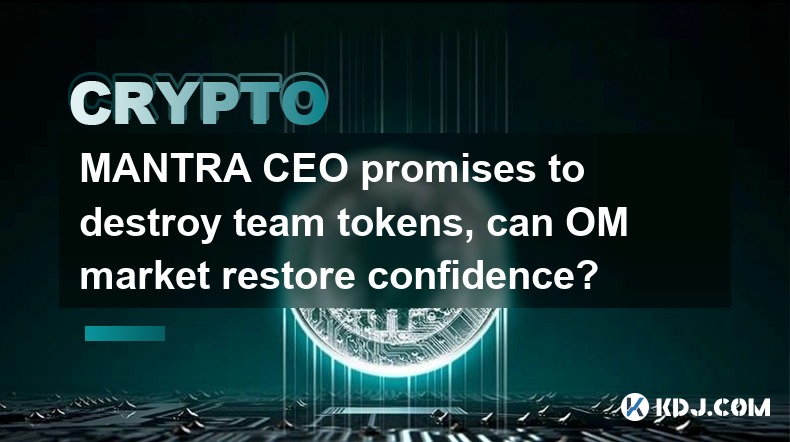
MANTRA CEO promises to destroy team tokens, can OM market restore confidence?
Apr 21,2025 at 08:28am
The recent announcement from the CEO of MANTRA about destroying team tokens has sparked a wave of discussions within the cryptocurrency community. This move is seen as a strategic effort to restore confidence in the OM market, which has been facing various challenges. The decision to burn team tokens is not just a simple action; it involves a series of ...
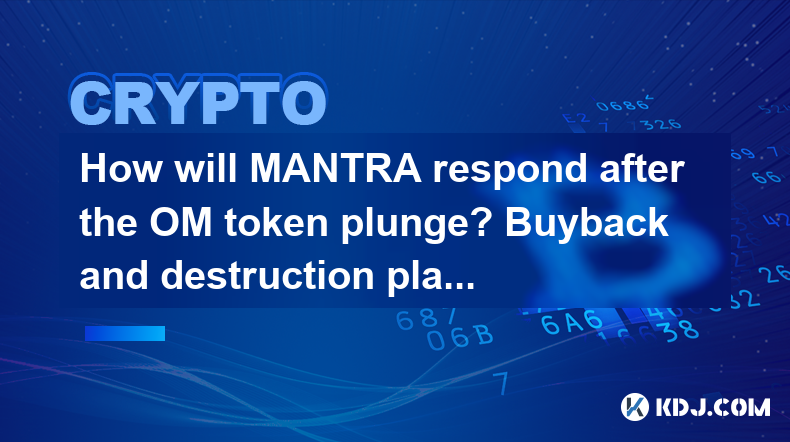
How will MANTRA respond after the OM token plunge? Buyback and destruction plan revealed
Apr 19,2025 at 11:42pm
The recent plunge in the OM token price has left many investors and enthusiasts of the MANTRA ecosystem concerned about the future stability and value of their holdings. In response to these market fluctuations, MANTRA has announced a comprehensive buyback and destruction plan aimed at restoring confidence and supporting the long-term health of the OM t...
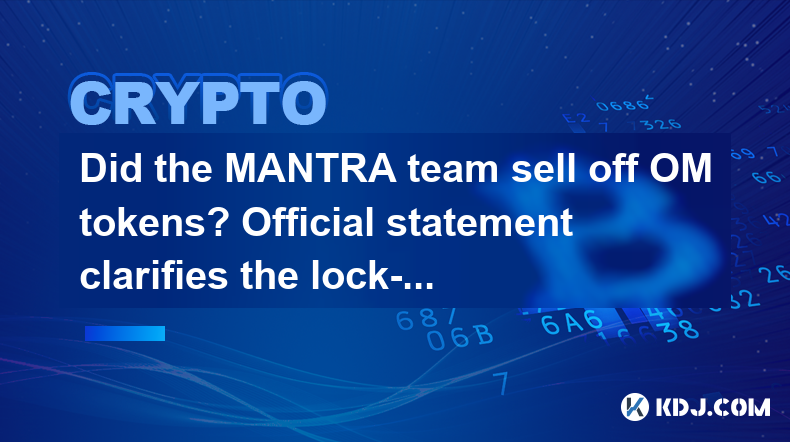
Did the MANTRA team sell off OM tokens? Official statement clarifies the lock-up situation
Apr 19,2025 at 10:56pm
The recent buzz around the MANTRA project and its native token, OM, has led to speculation and concerns within the cryptocurrency community about whether the MANTRA team has sold off their OM tokens. To address these concerns and clarify the situation, the MANTRA team has released an official statement detailing the lock-up situation of their tokens. Th...

All MANTRA team tokens are locked, why did OM still experience a sharp drop?
Apr 20,2025 at 11:14am
Introduction to MANTRA and OM TokenThe MANTRA project is a blockchain platform that aims to provide a scalable and secure environment for decentralized applications (dApps). The native token of the MANTRA ecosystem is OM, which plays a crucial role in governance, staking, and other functionalities within the platform. Recently, the MANTRA team announced...

MANTRA announces OM support plan. Can repurchase and destruction stabilize the currency price?
Apr 21,2025 at 01:57pm
MANTRA, a notable player in the cryptocurrency ecosystem, has recently announced an OM support plan that includes mechanisms for repurchasing and destroying tokens. This move has sparked significant interest and discussion within the crypto community, particularly around its potential impact on the stability of the OM token's price. In this article, we ...

A large amount of OM was liquidated due to collateralization, causing a sharp drop? MANTRA analyzes the reasons for the market turmoil
Apr 21,2025 at 01:57am
The cryptocurrency market is known for its volatility, and sharp price movements can often be attributed to a variety of factors. Recently, a large amount of OM (Mantra DAO's native token) was liquidated due to collateralization issues, leading to significant market turmoil. In this article, MANTRA analyzes the reasons behind this event and the subseque...

MANTRA CEO promises to destroy team tokens, can OM market restore confidence?
Apr 21,2025 at 08:28am
The recent announcement from the CEO of MANTRA about destroying team tokens has sparked a wave of discussions within the cryptocurrency community. This move is seen as a strategic effort to restore confidence in the OM market, which has been facing various challenges. The decision to burn team tokens is not just a simple action; it involves a series of ...

How will MANTRA respond after the OM token plunge? Buyback and destruction plan revealed
Apr 19,2025 at 11:42pm
The recent plunge in the OM token price has left many investors and enthusiasts of the MANTRA ecosystem concerned about the future stability and value of their holdings. In response to these market fluctuations, MANTRA has announced a comprehensive buyback and destruction plan aimed at restoring confidence and supporting the long-term health of the OM t...

Did the MANTRA team sell off OM tokens? Official statement clarifies the lock-up situation
Apr 19,2025 at 10:56pm
The recent buzz around the MANTRA project and its native token, OM, has led to speculation and concerns within the cryptocurrency community about whether the MANTRA team has sold off their OM tokens. To address these concerns and clarify the situation, the MANTRA team has released an official statement detailing the lock-up situation of their tokens. Th...
See all articles






















































































